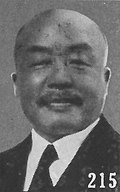Fujian Provincial Government
 From Wikipedia - Reading time: 6 min
From Wikipedia - Reading time: 6 min
| 福建省政府 Fújiàn Shěng Zhèngfǔ (Mandarin) Fuk-kien Sén Chṳn-fú (Hakka) | |
 Seal of Fujian Province | |
| Agency overview | |
|---|---|
| Formed | 21 May 1927 |
| Dissolved | 1 January 2019 (de facto) |
| Superseding agency | |
| Jurisdiction | Fujian Province (Kinmen and Matsu) |
| Parent agency | Executive Yuan |
| Fujian Provincial Government | |||||||||||||||||||||||
|---|---|---|---|---|---|---|---|---|---|---|---|---|---|---|---|---|---|---|---|---|---|---|---|
| Chinese | 福建省政府 | ||||||||||||||||||||||
| |||||||||||||||||||||||
The Fujian Provincial Government is the nominal government of the streamlined Fujian Province of the Republic of China. Founded in 1927 in the mainland portion of Fujian, it was evacuated to Kinmen in 1949.
Since 2018, it has been superseded and its duties have been transferred to the Kinmen-Matsu Joint Services Center, the National Development Council and other ministries of the Executive Yuan.[1]
History
[edit]The Fujian Provincial Government was founded in 1927 by the Nationalist government in Fuzhou (Foochow). Some parts of the province was under the control of either the Chinese Soviet Republic or the Fujian People's Government. The provincial government was relocated to Yong'an County in 1938 after the Japanese forces occupied the capital Fuzhou during the Second Sino-Japanese War.
After the conclusion of the war, the Fujian provincial government moved back to Fuzhou in 1945. However, the late stages of the Chinese Civil War forced the government to relocate to Kinmen County in 1949 while the Communists founded the People's Republic of China. The central government has imposed martial law and Kinmen became a militarized zone causing the provincial government to relocate to Xindian Township, Taipei County within Taiwan Province in 1956. With the end of martial law, Kinmen became demilitarized in 1992 and on 15 January 1996, the provincial government moved back to Kinmen County.[2]
On 1 July 2018, by a resolution passed during the 3606th meeting of the Executive Yuan, all the remaining duties were transferred to the National Development Council and other ministries of the Executive Yuan.[3] The transformation were scheduled to be done before the end of the year 2018. However, the government will keep the position of Governor of Fujian Province to comply with the requirement set by the Additional Articles of the Constitution.
Government structure
[edit]The only official who served in the provincial government was the Governor of Fujian Province (also called the Chairperson of the Fujian Provincial Government). The Governor was usually also a minister without portfolio in Executive Yuan.
The provincial government was left with no physical building or office space after all of its functionalities were handed over to the central government in 2018. Historically, the provincial government was located in Fuzhou from 1927 to 1938 and 1945 to present de jure; Yong'an from 1938 to 1945 during the Japanese occupation, Jincheng, Kinmen from 1949 to 1956, in Xindian, Taipei County from 1956 to January 1996 and in Jincheng, Kinmen again from January 1996 to 2018.

Governor of Fujian Province
[edit]The Governor of Fujian Province is the Chairperson of the Fujian Provincial Government.
Government in Fuzhou (Minhou County)[edit] | |||||
|---|---|---|---|---|---|
| № | Portrait | Name (Birth–Death) |
Term of Office | Political Party | |
| 1 | 
|
Yang Shu-chuang[4] 楊樹莊 Yáng Shùzhuāng (1882–1934) |
1 May 1927 | 7 December 1932 | Kuomintang |
| Concurrently held position as Minister of the Navy. | |||||
| — | Chen Nai-yuan 陳乃元 Chén Nǎiyuán (1878–1930) |
5 February 1929 | 6 January 1930 | Kuomintang | |
| As acting; head of Provincial Civil Affairs Department. | |||||
| — | 
|
Fang Sheng-tao 方聲濤 Fāng Shēngtāo (1885–1934) |
6 January 1930 | 7 December 1932 | Kuomintang |
| As acting; head of Provincial Public Security Department. | |||||
| 2 | 
|
Chiang Kuang-nai[4] 蔣光鼐 Jiǎng Guāngnài (1888–1967) |
7 December 1932 | 20 December 1933 | Kuomintang |
| 3 | 
|
Chen Yi 陳儀 Chén Yí (1883–1950) |
12 January 1934 | 28 August 1941 | Kuomintang |
| Provincial government relocated to Yong'an County from 1938 after Japan instituted a sea blockade and the Second Sino-Japanese War. | |||||
| 4 | 
|
Liu Chien-hsü[4] 劉建緒 Liú Jiànxù (1892–1978) |
28 August 1941 | 16 September 1948 | Kuomintang |
| Government relocated back to Fuzhou in 1945. | |||||
| 5 | Li Liang-jung 李良榮 Lǐ Liángróng (1906–1967) |
16 September 1948 | 20 January 1949 | Kuomintang | |
| 6 | 
|
Chu Shao-liang[4] 朱紹良 Zhū Shàoliáng (1891–1963) |
20 January 1949 | 4 October 1949 | Kuomintang |
| № | Portrait | Name (Birth–Death) |
Term of Office | Political Party | |
| — | 
|
Fang Chih[5] 方治 Fāng Zhì (1895–1989) |
18 August 1949 | 30 September 1949 | Kuomintang |
| As acting; Member of the National Assembly. | |||||
| — | Huang Chin-tao 黃金濤 Huáng Jīntāo (1888–1957) |
30 September 1949 | 23 November 1949 | Kuomintang | |
| As acting; head of Provincial Public Works Department. | |||||
| 7 | 
|
Hu Lien 胡璉 Hú Liǎn (1907–1977) |
23 November 1949 | 1 February 1955 | Kuomintang |
| Concurrently held position as Commander of the Kinmen Defense Command. | |||||
Government in Hsintien, Taipei County[edit] | |||||
| № | Portrait | Name (Birth–Death) |
Term of Office | Political Party | |
| 8 | 
|
Tai Chung-yu 戴仲玉 Dài Zhòngyù (1910–1986) |
1 February 1955 | 21 May 1986 | Kuomintang |
| Provincial Government relocated to Hsintien, Taipei County, Taiwan in July 1956. Longest serving chairperson. Died in office. | |||||
| 9 | 
|
Wu Chin-tzan 吳金贊 Wú Jīnzàn (1935–2012) |
20 June 1986 | 9 February 1998 | Kuomintang |
| Provincial Government returned to Kinmen on 15 January 1996. | |||||
| № | Portrait | Name (Birth–Death) |
Term of Office | Political Party | |
| 10 | 
|
Yen Chung-cheng 顏忠誠 Yán Zhōngchéng (1928–) |
10 February 1998 | 21 May 2007 | Kuomintang |
| — | Yang Cheng-hsi 楊誠璽 Yáng Chéngxǐ |
21 May 2007 | 28 November 2007 | Kuomintang | |
| As acting; head of the First Division of the Provincial Government. | |||||
| 11 | 
|
Chen Chin-jun 陳景峻 Chén Jǐngjùn (1956–) |
28 November 2007 | 20 May 2008 | Democratic Progressive Party |
| Concurrently held position as Secretary General of the Executive Yuan. | |||||
| 12 | 
|
Hsueh Hsiang-chuan 薛香川 Xuē Xiāngchuān (1944–) |
20 May 2008 | 10 September 2009 | Kuomintang |
| Concurrently held position as Secretary General of the Executive Yuan. | |||||
| 13 | 
|
James Hsueh 薛承泰 Xuē Chéngtài (1956–) |
10 September 2009 | 18 February 2013 | Kuomintang |
| Concurrently held position as Minister Without Portfolio. | |||||
| 14 | 
|
Chen Shyh-kwei[6] 陳士魁 Chén Shìkuí (1952–) |
18 February 2013 | 1 August 2013 | Kuomintang |
| Concurrently held position as Minister Without Portfolio. | |||||
| 15 | 
|
Luo Ying-shay 羅瑩雪 Luó Yíngxuě (1951–) |
1 August 2013 | 29 September 2013 | Kuomintang |
| Concurrently held position as Minister Without Portfolio and as Minister of the Mongolian and Tibetan Affairs Commission. | |||||
| 16 | 
|
Schive Chi[7] 薛琦 Xuē Qí (1947–) |
29 September 2013 | 25 March 2014 | |
| Concurrently held position as Minister Without Portfolio. | |||||
| 17 | 
|
John Deng 鄧振中 Dèng Zhènzhōng (1952–) |
25 March 2014 | 7 December 2014 | |
| Concurrently held position as Minister Without Portfolio. | |||||
| 18 | 
|
Woody Duh 杜紫軍 Dù Zǐjūn (1959–) |
7 December 2014 | 31 January 2016 | Independent |
| Concurrently held position as Minister Without Portfolio. | |||||
| 19 | 
|
Lin Chu-chia 林祖嘉 Lín Zǔjiā (1956–) |
31 January 2016 | 20 May 2016 | |
| Concurrently held position as Minister Without Portfolio and as Minister of the National Development Council. | |||||
| 20 | 
|
Chang Ching-sen 張景森 Zhāng Jǐngsēn (1959–) |
20 May 2016 | 1 January 2019[citation needed] | Independent |
| Concurrently held position as Minister Without Portfolio. | |||||
Timeline
[edit]
See also
[edit]- Taiwan Provincial Government
- Fujian Provincial People's Government, the People's Republic of China's parallel administration for its Fujian Province
References
[edit]- ^ "賴清德宣示「省級機關走入歷史」". 28 June 2018. Retrieved 17 July 2018.
- ^ "福建省政府". Archived from the original on 2014-09-05. Retrieved 2014-09-20.
- ^ "Taiwan Provincial Government Official Website". Archived from the original on 29 January 2019. Retrieved 17 July 2018.
- ^ a b c d Cahoon, Ben. "China Provinces and Administrative Divisions". www.worldstatesmen.org. World Statesmen. Retrieved 2 October 2015.
- ^ Cahoon, Ben. "China Provinces and Administrative Divisions". www.worldstatesmen.org. World Statesmen. Retrieved 2 October 2015.
(In Columns) "(May 1949 - 23 Nov 1949) (Fang Zhi) (Fang Chih) (Nationalist) (at Kinmen from 17 Aug 1949) (b. 1895 - d. 1989)"
- ^ "Executive Yuan, R.O.C. (Taiwan)-Executive Yuan Officials". Ey.gov.tw. Archived from the original on 2014-05-18. Retrieved 2014-05-18.
- ^ "Executive Yuan, R.O.C. (Taiwan)-Executive Yuan Officials". Ey.gov.tw. Archived from the original on 2013-10-21. Retrieved 2014-05-18.
External links
[edit] Media related to Fujian Provincial Government at Wikimedia Commons
Media related to Fujian Provincial Government at Wikimedia Commons
 KSF
KSF